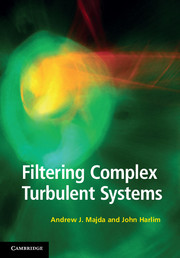Book contents
- Frontmatter
- Contents
- Preface
- 1 Introduction and overview: Mathematical strategies for filtering turbulent systems
- Part I Fundamentals
- Part II Mathematical guidelines for filtering turbulent signals
- Part III Filtering turbulent nonlinear dynamical systems
- 9 Strategies for filtering nonlinear systems
- 10 Filtering prototype nonlinear slow–fast systems
- 11 Filtering turbulent nonlinear dynamical systems by finite ensemble methods
- 12 Filtering turbulent nonlinear dynamical systems by linear stochastic models
- 13 Stochastic parametrized extended Kalman filter for filtering turbulent signals with model error
- 14 Filtering turbulent tracers from partial observations: An exactly solvable test model
- 15 The search for efficient skillful particle filters for high-dimensional turbulent dynamical systems
- References
- Index
13 - Stochastic parametrized extended Kalman filter for filtering turbulent signals with model error
from Part III - Filtering turbulent nonlinear dynamical systems
Published online by Cambridge University Press: 05 March 2012
- Frontmatter
- Contents
- Preface
- 1 Introduction and overview: Mathematical strategies for filtering turbulent systems
- Part I Fundamentals
- Part II Mathematical guidelines for filtering turbulent signals
- Part III Filtering turbulent nonlinear dynamical systems
- 9 Strategies for filtering nonlinear systems
- 10 Filtering prototype nonlinear slow–fast systems
- 11 Filtering turbulent nonlinear dynamical systems by finite ensemble methods
- 12 Filtering turbulent nonlinear dynamical systems by linear stochastic models
- 13 Stochastic parametrized extended Kalman filter for filtering turbulent signals with model error
- 14 Filtering turbulent tracers from partial observations: An exactly solvable test model
- 15 The search for efficient skillful particle filters for high-dimensional turbulent dynamical systems
- References
- Index
Summary
Throughout the book, we have stressed that a central issue in practical filtering of turbulent signals is model error. Naively, one might think that model errors always have a negative effect on filter performance and indeed this was illustrated in Chapters 2 and 3 in simple examples with simple time differencing methods like backward or forward Euler with associated natural time discrete noise. However, a central issue of this book is to emphasize that judicious model errors in the forward operator, guided by mathematical theory, can both ameliorate the effect of the curse of ensemble size for turbulent dynamical systems and retain high filtering skill, remarkably, often exceeding that with the perfect model! In particular, we have illustrated these principles with various model errors arising from using approximate numerical solvers (Chapter 2), reduced strategies for filtering dynamical systems with instability (Chapters 3 and 8), reduced strategies for filtering sparsely observed signals (Chapter 7) and simple linear stochastic models for filtering turbulent signals from nonlinear dynamical systems (Chapters 5, 10, and 12). In our earlier discussion (see Chapters 8, 10, and 12), we demonstrated that the off-line strategy accounting for model errors, the mean stochastic model (MSM), under some circumstances produces reasonably accurate filtered solutions. However, this off-line strategy often has limited skill for estimating real-time prediction problems with rapid fluctuations that are often observed in nature since the off-line strategy (MSM) relies heavily on a fixed parameter set that is extracted from long-time or climatological statistical quantities such as the energy spectrum and correlation time.
- Type
- Chapter
- Information
- Filtering Complex Turbulent Systems , pp. 236 - 275Publisher: Cambridge University PressPrint publication year: 2012



